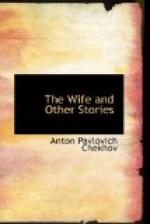When she got up at eleven o’clock every morning, Olga Ivanovna played the piano or, if it were sunny, painted something in oils. Then between twelve and one she drove to her dressmaker’s. As Dymov and she had very little money, only just enough, she and her dressmaker were often put to clever shifts to enable her to appear constantly in new dresses and make a sensation with them. Very often out of an old dyed dress, out of bits of tulle, lace, plush, and silk, costing nothing, perfect marvels were created, something bewitching—not a dress, but a dream. From the dressmaker’s Olga Ivanovna usually drove to some actress of her acquaintance to hear the latest theatrical gossip, and incidentally to try and get hold of tickets for the first night of some new play or for a benefit performance. From the actress’s she had to go to some artist’s studio or to some exhibition or to see some celebrity—either to pay a visit or to give an invitation or simply to have a chat. And everywhere she met with a gay and friendly welcome, and was assured that she was good, that she was sweet, that she was rare.... Those whom she called great and famous received her as one of themselves, as an equal, and predicted with one voice that, with her talents, her taste, and her intelligence, she would do great things if she concentrated herself. She sang, she played the piano, she painted in oils, she carved, she took part in amateur performances; and all this not just anyhow, but all with talent, whether she made lanterns for an illumination or dressed up or tied somebody’s cravat—everything she did was exceptionally graceful, artistic, and charming. But her talents showed themselves in nothing so clearly as in her faculty for quickly becoming acquainted and on intimate terms with celebrated people. No sooner did any one become ever so little celebrated, and set people talking about him, than she made his acquaintance, got on friendly terms the same day, and invited him to her house. Every new acquaintance she made was a veritable fete for her. She adored celebrated people, was proud of them, dreamed of them every night. She craved for them, and never could satisfy her craving. The old ones departed and were forgotten, new ones came to replace them, but to these, too, she soon grew accustomed or was disappointed in them, and began eagerly seeking for fresh great men, finding them and seeking for them again. What for?
Between four and five she dined at home with her husband. His simplicity, good sense, and kind-heartedness touched her and moved her up to enthusiasm. She was constantly jumping up, impulsively hugging his head and showering kisses on it.
“You are a clever, generous man, Dymov,” she used to say, “but you have one very serious defect. You take absolutely no interest in art. You don’t believe in music or painting.”
“I don’t understand them,” he would say mildly. “I have spent all my life in working at natural science and medicine, and I have never had time to take an interest in the arts.”




